How the age limit ruling was delivered
The judgement in a petition challenging the removal of the age limit in the constitution was delivered on Thursday.
From L-R: Justices: Cheborion Barishaki, Remmy Kasule, Alfonse Owiny-Dolo, Kenneth Kakuru and Elizabeth Musoke in Mbale High Court during the ruling. Photos by Donald Kiirya
The Constitutional Court yesterday, by a majority judgment, upheld the amendment to the constitution that scrapped the presidential age limit from the Constitution. However, the Justices of the Constitutional Court in chorus declared as null and void the amendment extending from five to seven years, the term of the Members of Parliament and other elected political leaders.
The court further declared as null and void the amendment to the Constitution restoring the presidential two-term limit. However, Justice Kenneth Kakuru differed, and sought to expunge the entire Constitutional Amendment Act 2017. Justice Kakuru said: "The consolidated petitions substantially succeed. I hereby declare the constitutional amendments relating to the age limit unconstitutional.''
He ordered that costs paid to the petitioners. Some of the Justices also exonerated the action of the military in storming Parliament and the Speaker, Rebecca Kadaga, for expelling some of the MPs during consideration of the age limit Bill.
Justice Barishaki Justice Cheborion Barishaki was the first to deliver his judgment. "The extension of the term of Parliament from five to seven years is null and void. Extension was selfish and goes against the principle of good governance," Justice Barishaki said. He added that Parliament should have exercised "patience and caution".
Justice Barishaki said the "majority" in Parliament was unwilling to listen to the voice of the minority. But he exonerated the Speaker from any violations of the law. Instead, he denounced the unruly conduct of some of the MPs as unacceptable. "I do not agree with the petitioners that the involvement of the army in Parliament was unjustified. There were life-threatening, incidents, in Parliament and, therefore, it was justified for the army to be called in to support the Police," Justice Barishaki said. "Even though the security forces intervention was justifiable, the treatment of the MPs was inhumane, arresting and detention was not justified," Barishaki added.
He described as "obnoxious" the directive issued by Assistant Inspector General of Police (AIGP) Asuman Mugenyi curtailing MPs from consulting outside their constituencies. "It was recklessly and wantonly issued without any regard to the law," Barishaki said. Barishaki, in his judgment, which lasted three-and-a-half hours, said in amending Article 102 (b) of the Constitution, Parliament followed all the necessary, rules and procedures of the house and did not contravene any articles of the Constitution or other laws.
Nullifying this particular amendment, he said, would imply that Parliament has no powers whatsoever to amend the national constitution, which is its legal mandate. The Bill, he noted, was duly debated and passed by the house, a certificate of financial implication was issued by the finance ministry and the President assented to it.
Barishaki said he failed to find any evidence or legal provision which proved that by removing the presidential age limit, Parliament in effect, subverted the powers of the people granted to them under Article 1 of the Constitution. "I am unable to agree with the petitioners' proposition.
If their argument was to hold, it would mean that Parliament has absolutely no powers to amend any provision of the Constitution," he said. Barishaki, however, nullified, among others, the Constitutional amendment which extended the terms of MPs and local government leaders, from five to seven years, stating that this was illegally smuggled into the Bill and passed without consultations with the members of the public. Justice Musoke Like her colleague, Justice Elizabeth Musoke also ruled that the military intervention arose from the MPs' conduct and is demonstrably justifiable in a free and democratic society.
Musoke said the reluctance of the suspended MPs to leave the House could have led to their eviction and subsequent arrest... ‘‘Speaker acted within her powers when she ordered for the suspension and eviction of MPs." Musoke added that the deployment of security forces at and around Parliament did not negatively impact on the debate and age limit Bill enactment.
"After the eviction of MPs, business went back to normal and, during the Bill passing there was a full House," Musoke added. She further said the sh29m given to MPs to facilitate consultations, did not contravene the law. Justice Kakuru Justice Kenneth Kakuru gave a detailed historical background of Uganda and quoted President Museveni's 1986 speech where he promised democratic governance, change in quality of politics and people power.
Kakuru said by Parliament allocating themselves power to extend term of office it is like Amin declaring himself life president. "Extension of the term of Parliament breaks the sovereignty of the people and supremacy of the Constitution. The abolishment means Parliament can even abolish the Judiciary and invest its powers in itself based on a legal misconception," Justice Kakuru said.
He said the execution of the Age Limit Bill appeared to have been well-planned and premeditated by a few backbenchers with the support of the Attorney General. "I find that there was no public participation," Kakuru added. "I am unable to find any reasonable justification for the MPs to award themselves two years on top of the five without consulting their electorates," he added. ‘‘Parliament could as well abolish the Judiciary, vote to remove the republic of Uganda and make themselves parliamentarians for life.
The argument that you can vote to amend any article of the Constitution by a simple majority is misguided," Kakuru said. Justice Kakuru: "I find that amendment of term limits was in contravention of Article 93 of the Constitution, was not debated by the committee, was not debated by people of Uganda and I find its passing was unconstitutional." Kakuru said the two months for the committee to consult Ugandans was not enough. "I do not think two months were enough for Members of Parliament to seek the views of Ugandans on such an issue," he said.
Kakuru added: "What happened in the passing of the age limit law appears to have been window dressing and a clumsy one." "MPs consulted very few people; actually they consulted about 0.0002% of voters, even if they added themselves to the list of those consulted," he said. "Some of the people that interfaced with the committee represented Uganda Association of the Uneducated. It is unfortunate that these are the people that represented Ugandans, I have restrained myself from using stronger
Court okays age limit removal, quashes 7-year term for MPs
language," Kakuru said. He singled out MP Betty Nambooze as not being truthful in her testimony. ‘‘Betty Nambooze was not a truthful witness... she did not return the sh29m as alleged," Kakuru said.
Justice Kasule Justice Remmy Kasule also took court through the political history of Uganda as he started to deliver his judgment. He said extending the term of office for MPs was illegal. "Power to amend is within the Constitution, but should not be used to create a situation where the power to amend can be done outside the Constitution," Kasule said.
Justice Owiny-Dollo The fifth and final judgment was read by the Deputy Chief Justice, Alfonse Owiny-Dollo. By press time, he was still delivering the judgment. Justice Owiny-Dollo, among other things, said: "MPs were subjective to their narrow personal interests above the public good when they pushed for their term in office to be extended. This was a breach in the contract between them and the people, according to the law of agency."
Lukwago responds Responding to the ruling, one of the petitioners' lawyers, Erias Lukwago said: "The frustration and disillusionment many of you and I feel this evening cannot be gainsaid. But I believe it has not been an exercise in futility, for the Luganda adage ‘nkuwaabidde takuvirako awo' has come to pass."
"I am glad that the Constitutional Court has embraced and incorporated into our constitutional jurisprudence the novel doctrine of ‘‘basic structure''; a very instrumental tool that informed judicial activism in a number of Commonwealth jurisdictions like India, South Africa, Belize, etc,'' he said.
‘‘I am only disappointed that they shied away from applying it to all the provisions of the impugned Age Limit Act and strike it down. Nonetheless, it provides a firm foundation for the next course of action," Lukwago added. "We should not lose sight of the fact that even leopards sweat. We should not despair. Step by step, brick by brick we shall build the Uganda we want," he said.
Security tight in Mbale ahead of Constitutional Court judgement
Judegment of the long awaited Age Limit petition is expected to be delivered today at Mbale High Court.
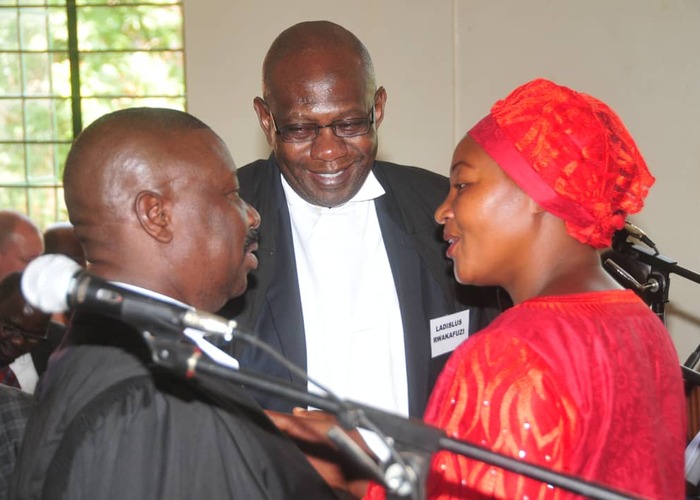
Mwesigwa Rukutana, Rwakafuzi and Winfred Kiiza at court.
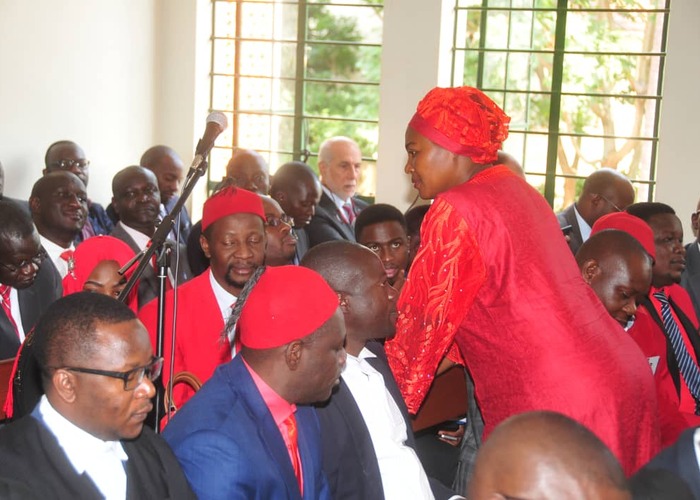
Opposition MPs wearing their trademark 'Togikwatako' red colour in court
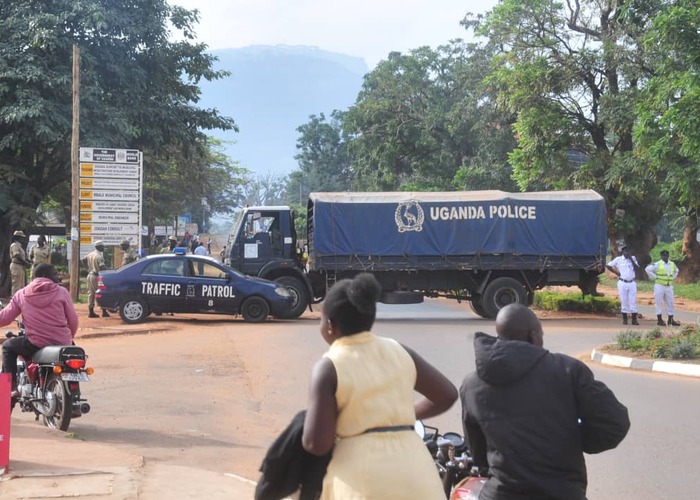
Security is tight around court and through the Mbale town
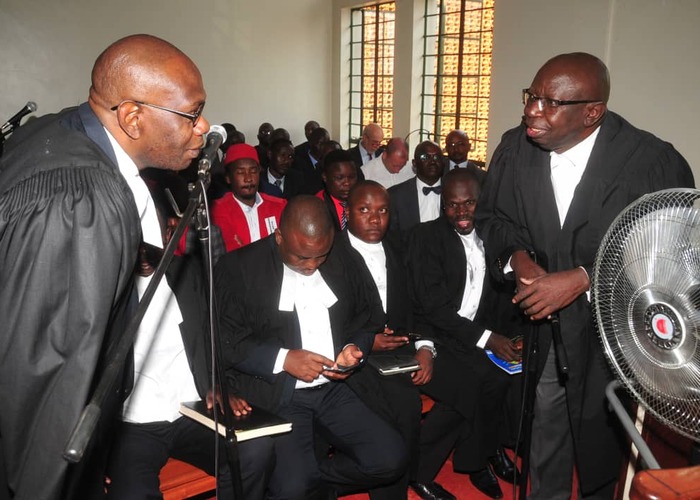
Lawyers ready for judgement
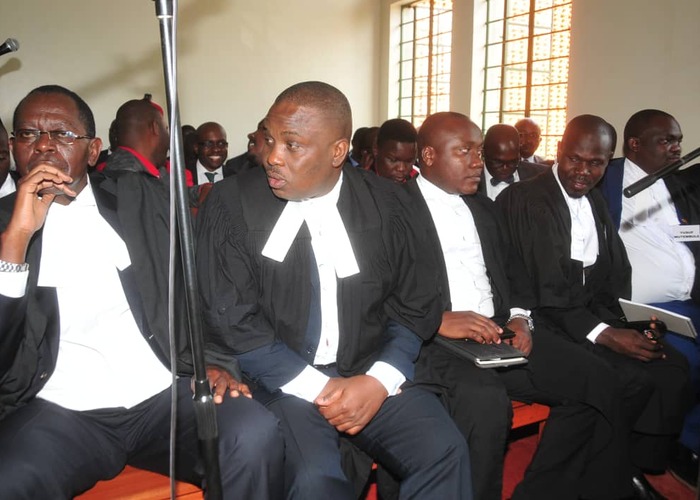
Lord Mayor Erias Lukwago (centre) in court
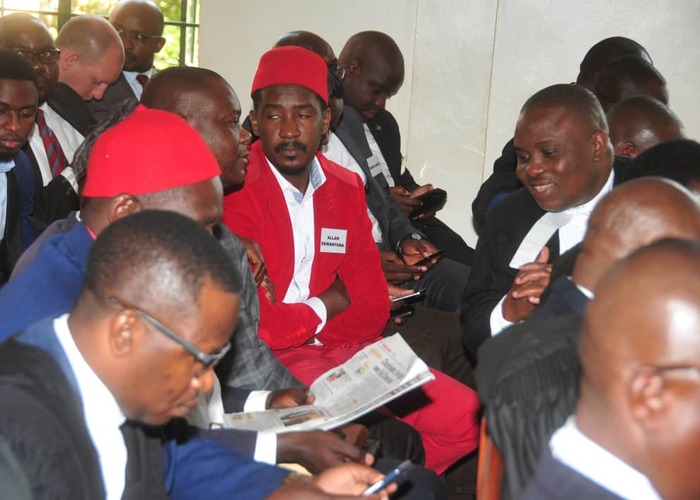
But how did the debate on the age limit start?